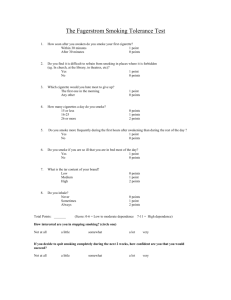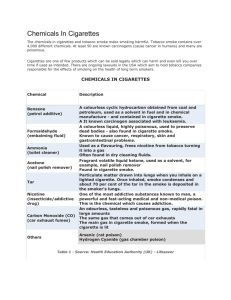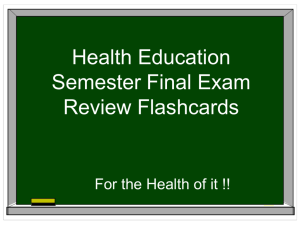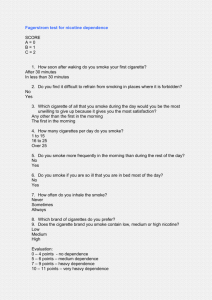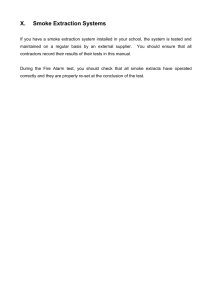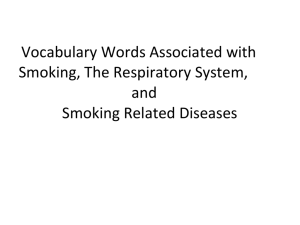6th Grade Assessment Review Guide Name
advertisement
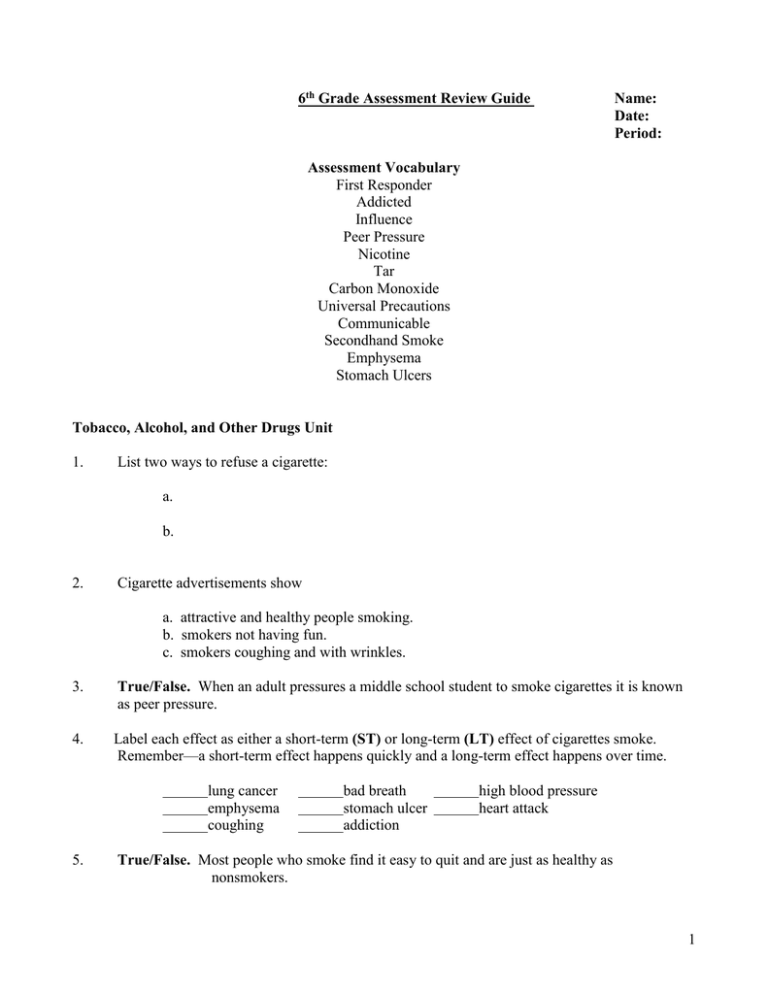
6th Grade Assessment Review Guide Name: Date: Period: Assessment Vocabulary First Responder Addicted Influence Peer Pressure Nicotine Tar Carbon Monoxide Universal Precautions Communicable Secondhand Smoke Emphysema Stomach Ulcers Tobacco, Alcohol, and Other Drugs Unit 1. List two ways to refuse a cigarette: a. b. 2. Cigarette advertisements show a. attractive and healthy people smoking. b. smokers not having fun. c. smokers coughing and with wrinkles. 3. True/False. When an adult pressures a middle school student to smoke cigarettes it is known as peer pressure. 4. Label each effect as either a short-term (ST) or long-term (LT) effect of cigarettes smoke. Remember—a short-term effect happens quickly and a long-term effect happens over time. lung cancer emphysema coughing 5. bad breath stomach ulcer addiction high blood pressure heart attack True/False. Most people who smoke find it easy to quit and are just as healthy as nonsmokers. 1 6. True/False. When someone quits smoking cigarettes the addict might feel sick and crave the tobacco. 7. Jackie pressured Nicole to smoke a cigarette at the mall. Nicole told Jackie that she did not want the cigarette and most people do not smoke. Is Nicole correct that most people do not smoke? 8. Match the following tobacco related words to their correct definition: nicotine tar carbon monoxide 9. a. black, sticky substance in tobacco b. colorless, odorless, poisonous gas c. chemical that causes addiction List two was to prevent second hand smoke. a. b. Disease Unit 1. True/False. Washing your hands is the best defense against disease. 2. A non-communicable disease cannot be spread from person to person. A communicable disease can be spread from person to person (one can infect someone else). Label each disease with a (N) for non-communicable or a (C) for communicable. cancer flu diabetes allergies common cold Safety, First Aid, and Injury Prevention 1. The person who first arrives at the emergency scene and stays till helps arrives is called the . 2. True/False. After calling 911 it is alright to leave the victim because help is on the way. 3. Circle the best ways to stay safe. Wear a helmet Open door to a stranger Tell a caller on the phone your parents are not home Don’t play with matches Wear a safety belt in car 2 4. List two ways to reduce your risk when riding in a car: a. b. 5. To treat someone who is bleeding you should a. lower the person’s body part below the heart. b. put medicine on the wound. c. wear gloves and apply pressure on the wound. 6. If someone has a burn they should a. cover it with a bandage. b. break blisters that have formed. c. put a cold wet cloth on the burn. 7. True/False. Families should plan ahead for an emergency before the event happens. 8. List two ways to be safe on the Internet: a. b. 9. Why would someone who is being abused not go for help? 10. Your friend is being abused at home. Who can you go to for help? (list 2 people) a. b. 11. True/False. Spreading rumors about someone on the Internet is an example of bullying. 12. You are being bullied at school and are afraid to go to class. What should you do? 3 13. Write the word “tattle” next to the tattling statements and write the word “tell” next to the telling statements. _____ “Devin did not do his homework.” _____ “Johnny wants to fight Michael after school today.” _____ “Nicole is chewing gum in class.” _____ “Caitlin has a weapon in her locker.” 14. Wearing a safety belt, wearing a helmet, crossing at a cross walk, and not opening your door to a stranger, are all examples of a. responding first. b. overreacting. c. being safety conscious. HIV/AIDS 1. True/False. HIV is a communicable disease. 2. Circle the ways that HIV can be spread: a. touching someone’s blood b. sexual contact c. being bitten by a mosquito 3. d. sharing needles e. using a public bathroom f. hugging someone HIV medicine a. cures the disease. b. slows down the virus. c. prevents death 4 6th Grade Family Life Assessment Vocabulary Words Adolescence Hormone Fertilization Menstruation Pituitary Ovary Testis Sexuality 6th Grade Family Life Assessment Review 1. During what stage in life does puberty occur? a. childhood b. adolescence c. adulthood 2. What is secreted by the endocrine glands and causes physical changes during puberty? 3. The role of the male reproductive organs are to produce a. egg cells. b. sperm cells. c. estrogen. 4. Label the parts of the reproductive system as either male (M) or female (F). ovary testes penis 5. vagina uterus vas deferens Match each term to the correct definition: Ovulation Fertilization ______Menstruation a. happens when an egg and a sperm join b. if an egg cell is not joined by a sperm this happens c. the release of an egg cell from an ovary 6. How many sperm are needed to fertilize an egg? _____ 7. When a person becomes sexually mature during puberty, the changes that occur happen due to a. a decrease in hormones. b. an increase in hormones. c. a change in height and weight. 5 8. The pea-sized gland that controls growth and development is . 9. The gland that produces estrogen and releases eggs is called . 10. The gland that produces testosterone and releases sperm is called . 11. The release of semen from the penis is called 12. When the lining of the uterus sheds from the vagina it is called . . 6
